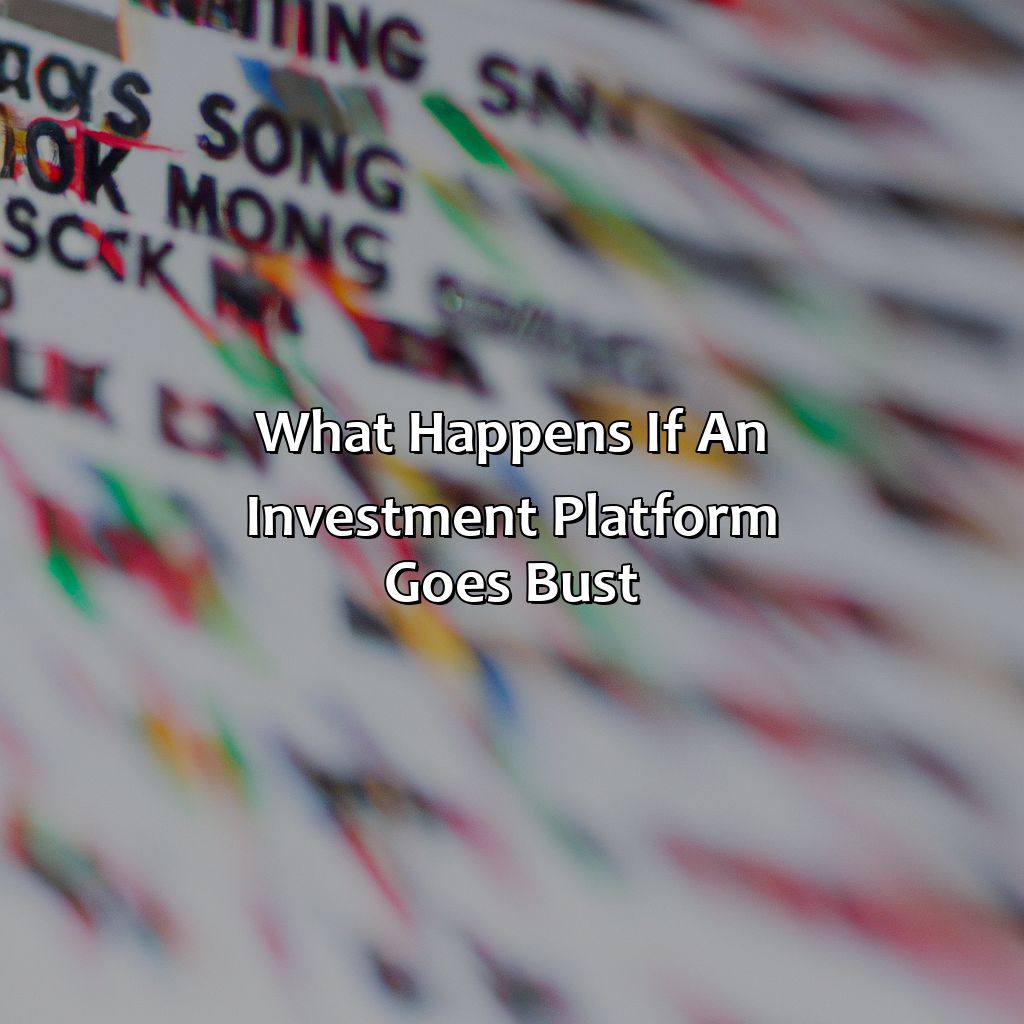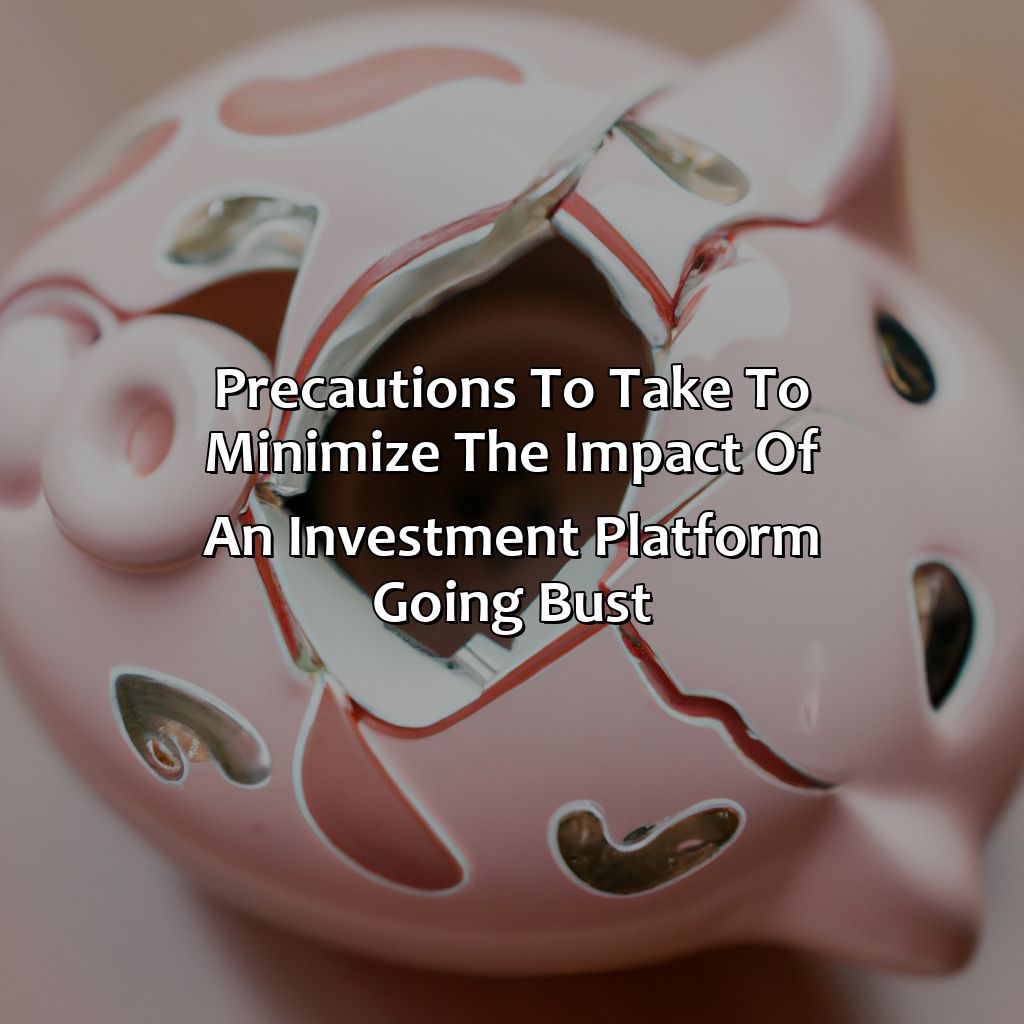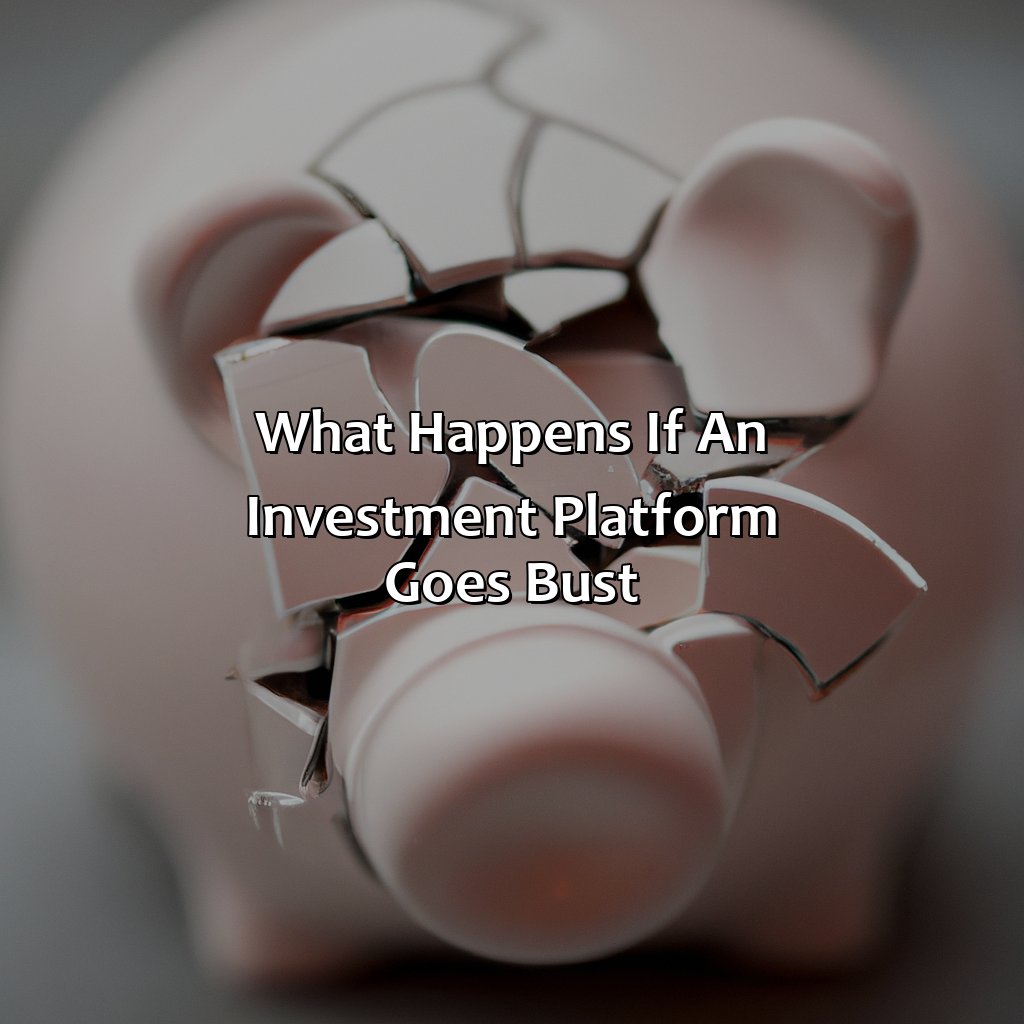What Happens If An Investment Platform Goes Bust?
Key Takeaway:
- Choosing a secure investment platform is crucial: As an investor, it’s essential to look for a platform that offers a high level of security for your investments. This includes features like encryption, two-factor authentication, and strict verification processes.
- There are various risks involved in investing in an investment platform: Market risks, operational risks, and credit risks are some of the risks involved in investing in an investment platform. As an investor, it’s important to understand these risks and be prepared to face them.
- If an investment platform goes bust, there are recovery processes in place: Depending on the situation, there are various recovery processes in place for investors if an investment platform goes bust. These include investor protection schemes and a recovery process initiated by the platform itself.
Have you invested your hard-earned money in an investment platform, only to worry about what would happen if the platform collapses? In this article, we will provide you with information to help you prepare for the worst-case scenario. You’ll learn how to protect yourself and your investments from platform failure.
Importance of choosing a secure investment platform
In the world of investing, security should never be overlooked. Choosing a dependable investment platform is paramount, as it can safeguard your returns and investments. It is imperative to assess the security measures in place before making a decision. Look for platforms that utilize secure socket layer encryption and multi-factor authentication to protect your data and funds. In addition, seek out platforms that are registered with a regulatory body to ensure their legitimacy. Remember, a secure investment platform can mean the difference between profit and loss.
Investment platforms that go bust can have dire consequences for investors. In such situations, the platform’s bankruptcy could lead to the loss of all the investments. It is essential to note that the compensation for such losses varies drastically based on the platform’s location. Regulated platforms may offer some form of protection, but it may not cover the full investment amount. Investors may have to wait extended periods before receiving any compensation. Therefore, it is crucial to research the protection offered before investing in a platform.
According to Reuters, the investment platform Beaufort Securities collapsed in 2018 due to regulatory issues, resulting in £800 million in losses and a significant setback for investors. It highlights the importance of choosing a secure investment platform. Remember, it’s not just about the returns you get; it’s also about ensuring your investments are safe.

Image credits: retiregenz.com by David Arnold
Risks involved in investing in an investment platform
Investing in an investment platform brings many risks. Such as:
- Market risks
- Operational risks
- Credit risks
If the investment platform goes bust, what then? To understand, you must look into the sub-sections of these risks. Then, you can better comprehend how they may affect your investment.

Image credits: retiregenz.com by James Woodhock
Market risks
When investing in an investment platform, there are potential market risks that should be considered. These risks can cause significant losses or even result in the platform going bankrupt. It is important to understand the potential risks involved and take steps to mitigate them.
One of the major risks is market volatility, which can lead to fluctuations in asset prices and potentially significant losses. Another risk is regulatory changes, which can impact the operations of investment platforms and potentially lead to financial difficulties.
In addition to these risks, there may also be operational risks such as technology failures or cyber attacks that could compromise investor data and lead to financial losses. It’s important to carefully evaluate the platform’s security measures and contingency plans before investing.
To stay protected from these potential risks, it is advisable to diversify your investments across multiple platforms and asset classes. Additionally, you should continuously monitor your investments and keep track of any changes or new developments that might affect them.
Don’t risk losing your hard-earned money by overlooking potential market risks when considering investing in an investment platform. Take necessary precautions before making any decisions about investing.
Putting your money into an investment platform is like playing a game of Jenga. You never know when the whole thing is going to come crashing down.
Operational risks
When investing in an investment platform, there are operational risks involved that must be carefully considered. Such risks pertain to the functioning of the platform, and they may result in a loss of investment or profits. For instance, when a platform experiences technical issues or faces hacking attempts, investors’ funds may be compromised. This risk can be minimized by investigating the platform’s security measures before investing.
Furthermore, platforms that lack transparency or regulatory compliance could impose risks for investors in case of legal disputes or illicit activities. Investment platforms may also face financial risks, especially when they invest in high-risk asset classes or carry out transactions with questionable entities. To mitigate these risks, investors can investigate the platform’s financial position and investment strategies to prevent being exposed to unintended vulnerabilities.
Overall, operational risks should not discourage investors from exploring opportunities on investment platforms but require them to do due diligence. Researching an investment platform’s reputation, governance policies, regulatory compliance, and security protocols can go a long way in safeguarding one’s investments.
Pro-tip: Diversify your investments across multiple platforms to reduce concentration risk and enhance your portfolio’s performance potential.
If investing in an investment platform is a game of risk, then credit risks are like playing that game blindfolded while standing on one leg.
Credit risks
The potential danger of default or non-payment by investment platforms is a significant risk faced by investors known as Credit Risks. Such platforms operate on raising capital from investors, which could result in them being unable to repay their debts on time or at all. As a result, investors may suffer significant losses.
Investors need to research and assess the credibility and rating of these platforms before investing in them. A thorough understanding of the platform’s business model, financial history, and creditworthiness will enable investors to identify risk factors accurately.
It’s crucial for investors to diversify their investments across various platforms instead of placing all funds into one platform. Diversification provides an opportunity to mitigate credit risks by ensuring that only a small portion of the portfolio is affected by an investment default or bankruptcy.
Going from ‘investor’ to ‘creditor’ is a downgrade nobody wants to experience.
What happens if an investment platform goes bust?
Investor Protection Schemes and Recovery Process are solutions to what happens if an investment platform goes bust.
Protection Schemes cover investments and minimize losses.
Recovery Process focuses on recovering assets if the firm is unable to pay back debts.

Image credits: retiregenz.com by James Jones
Investor protection schemes
In case of insolvency or bankruptcy, investor protection schemes aid by providing certain compensations to investors. These schemes are set up to safeguard investors in the event of an investment firm’s failure. The purpose of these schemes is to secure the interests of individual and institutional investors by ensuring a certain degree of financial protection.
The coverage and compensation vary with different schemes. For instance, some cover up to a maximum limit per investor, while others offer percentage-based compensation. Additionally, protection levels may be higher for certain types of investment instruments, such as stocks or mutual funds.
It is important to note that these schemes are not always guaranteed and may fail in exceptional circumstances. Furthermore, some forms of investments, such as cryptocurrency investments and secured loans, may not fall under any regulatory regime.
As a precautionary measure, it is advisable to diversify investments across multiple platforms rather than investing solely in one platform. This reduces the risk exposure in case one platform fails. Investors should also keep themselves informed about their chosen platform’s financial stability and regulatory compliance.
In summary, investor protection schemes offer a degree of financial protection in the event of an investment platform’s collapse but cannot always be relied upon entirely. Diversification and awareness about the platforms being used can mitigate the risk factors for investors.
If you thought breaking up was hard to do, try recovering your investments after your platform goes bust.
Recovery process
If an investment platform goes through insolvency or bankruptcy, there is a process in place to recover some, if not all, of the investor’s money. The procedure begins with the appointment of an administrator who handles the platform’s affairs.
To handle such circumstances gracefully, investors can follow this 4-step guide:
- Contact the platform – Investors should reach out to their platform immediately to enquire about the situation.
- Check FSCS protection- Insured up to £85k and seek compensation from this government-backed scheme where appropriate.
- Consult specialist advice – Seeking professional advice from advisors and lawyers ensures that all steps taken are not only lawful but also profitable for customers.
- Diversify portfolio – To avoid future risks, spread money across different platforms and increase investments in exchange-traded funds (ETFs).
Furthermore, it is essential always to monitor those investments throughout their duration and keep track of any unusual activities. By reviewing statements each month and assessing whether returns align with previously agreed terms can indicate alerts.
Finally, in case of emergency events like platform bankruptcy or fraud, consider implementing two-factor authentication security measures as they strengthen security significantly by requiring users to produce multiple proofs of identity before allowing access.
Prepare for the worst, hope for the best, and always keep a backup plan for your backup plan when it comes to investment platforms.
Precautions to take to minimize the impact of an investment platform going bust
Investors must carefully consider the potential impact of an investment platform’s bankruptcy before investing. To minimize the impact of such an event, it is advisable to diversify investments across multiple platforms and hold them in separate accounts. Additionally, one should check the platform’s financial health, read the terms and conditions, and fully understand the risks involved.
In case of bankruptcy, investors should first expect delays in withdrawing funds. They should then file a claim with the platform and its regulator for compensation. However, this process can take months or even years, and the compensation may be less than the initial investment amount.
To avoid losing money in the event of platform bankruptcy, investors should research and plan carefully. It is crucial to prioritize safety over high returns and work with reputable platforms that have a proven track record of financial stability.
Investors must take proactive steps to minimize the impact of platform insolvency. While the fear of missing out on high returns can be tempting, one must prioritize safety and make informed investment decisions.

Image credits: retiregenz.com by Joel Jones
Five Facts About What Happens If An Investment Platform Goes Bust:
- ✅ When an investment platform goes bust, investors may lose some or all of their funds. (Source: Investopedia)
- ✅ Some investment platforms may be covered by insurance or government compensation schemes. (Source: Financial Times)
- ✅ Investors should check the terms and conditions of their investment platform to understand their risk. (Source: Money Advice Service)
- ✅ It is important for investors to diversify their investments to minimize the impact of one investment platform going bust. (Source: Forbes)
- ✅ In some cases, investors may be able to recover their funds through legal action or class action lawsuits. (Source: Bloomberg)
FAQs about What Happens If An Investment Platform Goes Bust?
What happens if an investment platform goes bust?
If an investment platform goes bust, there are a few potential outcomes depending on the type of investment and the laws of the country where the platform is based. Here are some possibilities:
Will I lose all of my investments if the platform goes bust?
If the platform is properly regulated, it should have some form of investor protection in place. This could include insurance that covers some or all of your losses, or the platform may be required to keep client assets separate from its own. However, if the platform is not regulated or the protection it offers is inadequate, you may lose some or all of your investments.
How do I know if an investment platform is properly regulated?
You can check the regulatory status of an investment platform by researching the laws and agencies that govern financial services in the country where the platform is based. In the US, for example, you can check the Securities and Exchange Commission’s database of registered investment advisers. Look for any red flags such as the lack of necessary licenses or certifications.
What can I do to protect myself from losses if an investment platform goes bust?
The best way to protect yourself from losses if an investment platform goes bust is to diversify your investments across different platforms and asset classes. This will help spread your risk and reduce the impact of any single platform failing.
What should I do if an investment platform goes bust?
If an investment platform goes bust, you should contact the platform’s administrators or liquidators to find out what will happen to your investments. You should also contact your financial advisor and any other parties involved in your investments such as custodians or brokers.
What steps can investment platforms take to prevent going bust?
Investment platforms can take several steps to prevent going bust, including maintaining adequate capital reserves, ensuring client assets are held separately from the platform’s own assets, and implementing rigorous risk management and compliance procedures. Platforms can also work with regulators and industry associations to ensure that they are meeting the highest standards of transparency and accountability.


